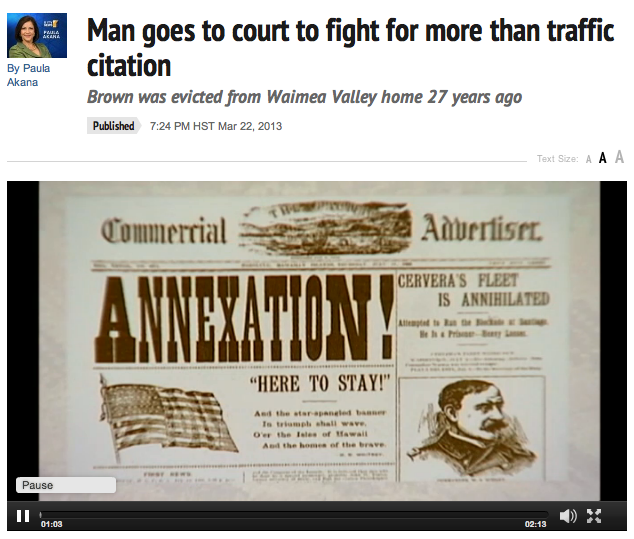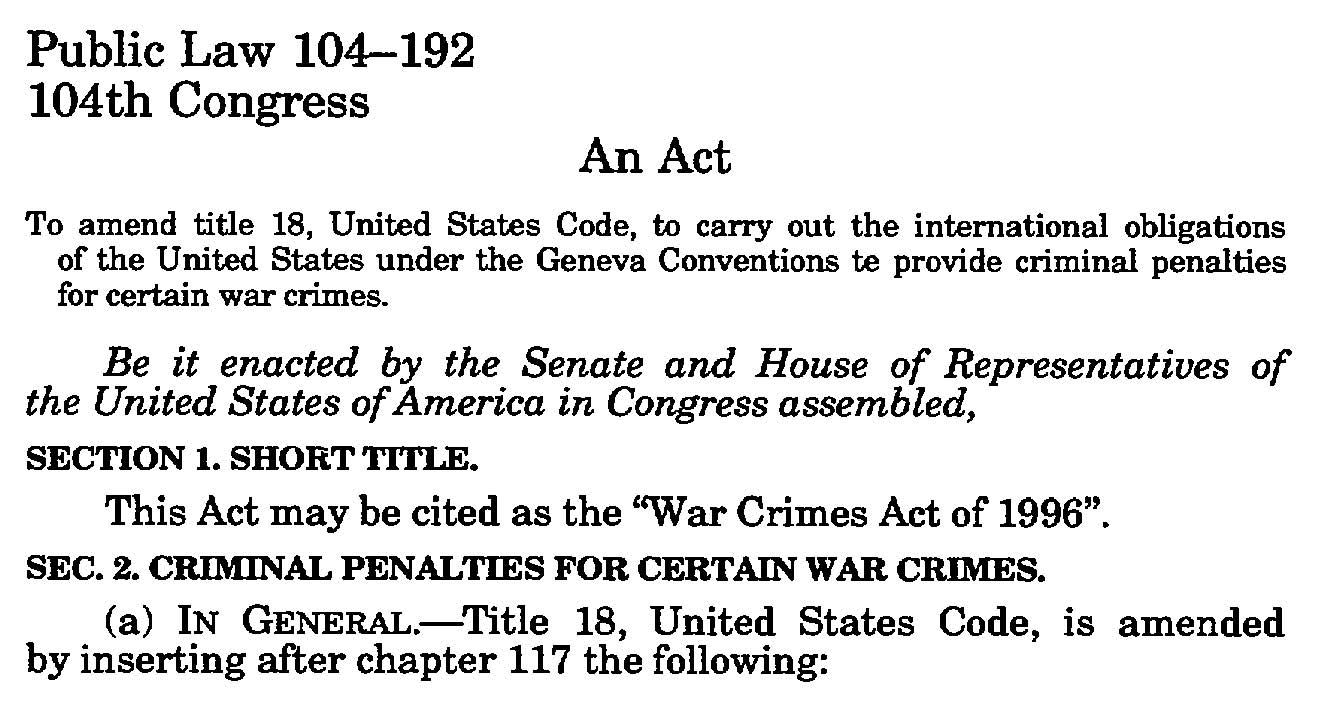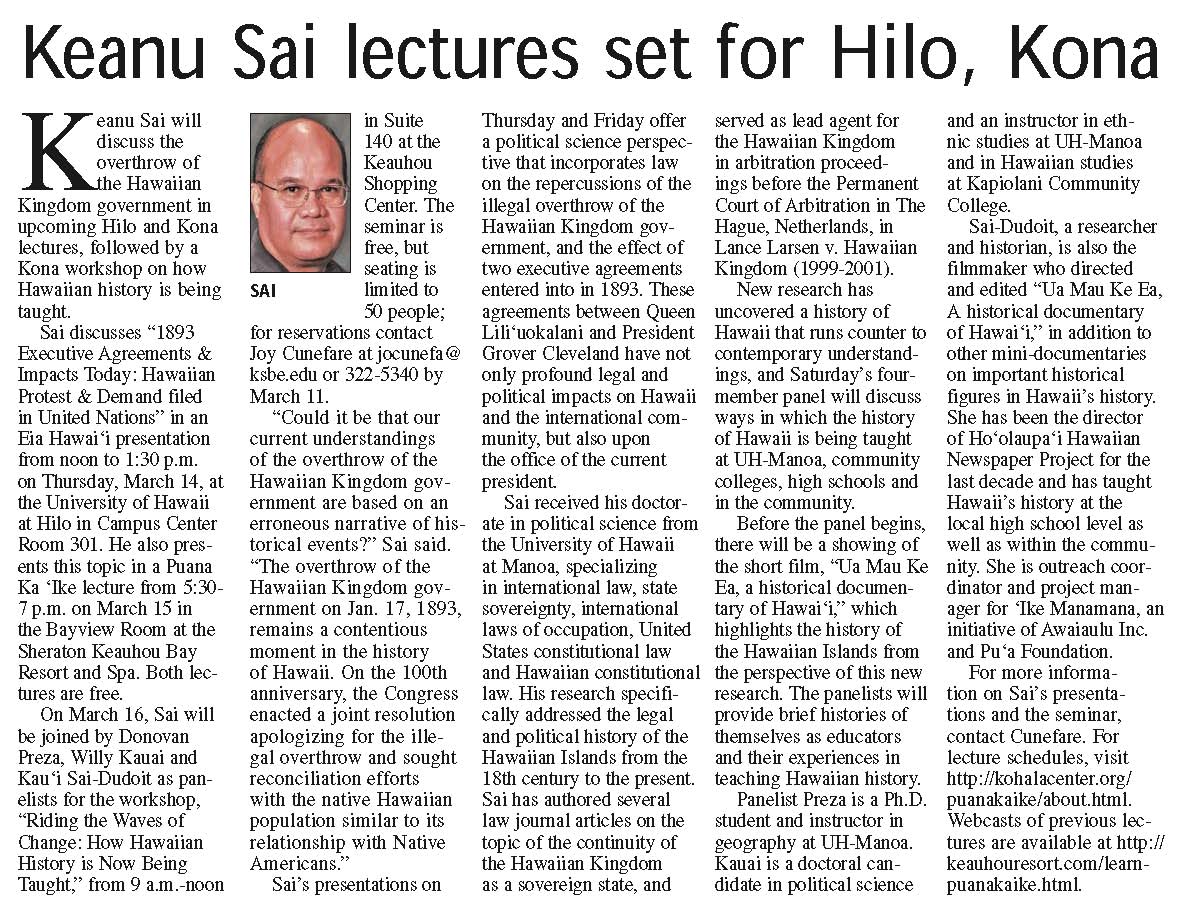Monthly Archives: March 2013
KITV News: Man Goes to Court to Fight for More Than Traffic Citations
Watch KITV News Man Goes to Court to Fight for More Than Traffic Citations.
Yesterday, Lopaka Brown, through his attorney Dexter Kaiama, esq., provided evidence and argument in District Court that the court is not lawfully constituted according to United States constitutional law and international law because there exists no treaty of annexation that would have incorporated the Hawaiian Islands into the United States of America. Without a treaty, U.S. law enacted by the Congress have no force and effect beyond U.S. territory, which nullifies the 1898 Joint Resolution of Annexation and the 1959 Statehood Act. The District Court derives its authority from the 1959 Statehood Act. The proper Court is a military commission established by the U.S. Pacific Command that administers Hawaiian Kingdom law and the laws of occupation.
Additional evidence provided to the court were two executive agreements entered into between Queen Lili‘uokalani and President Grover Cleveland that settled the illegal overthrow of the Hawaiian government. The first agreement, called the Lili‘uokalani assignment, binds the U.S. President, through the Pacific Command, to administer Hawaiian law and the laws of occupation. The second agreement, called the Agreement of restoration, binds the U.S. President to restore the government and thereafter the Queen to grant amnesty. Both agreements are treaties and under U.S. constitutional law are called sole-executive agreements. Sole-executive agreements are also binding upon successor Presidents for their faithful execution. See also War Crimes: The Role of the International Criminal Court during the Occupation of the Hawaiian Kingdom.
If the Court disregards the evidence, it would be committing a felony by denying Brown a fair trial according to Title 18, U.S.C., §2441. In 1996, Congress enacted the War Crimes Act that criminalized war crimes identified in the 1949 Geneva Conventions as felonies. Article 147 of the Fourth Geneva Convention states that failure to provide a fair trial in an occupied territory is a war crime. See also War Crimes are Felonies under U.S. Federal Law. The War Crimes Act is enforceable “outside” of U.S. territory when the United States military is the occupant of an occupied State.
War Crimes are Felonies under U.S. Federal Criminal Law
In 1996, the United States Congress enacted the War Crimes Act, 18 U.S.C. §2441, “to carry out the international obligations of the United States under the Geneva Conventions to provide criminal penalties for certain war crimes.” §2441 provides:
- (a) Whoever, whether inside or outside the United States, commits a war crime, in any of the circumstances described in subsection (b), shall be fined under this title or imprisoned for life or any term of years, or both, and if death results to the victim, shall also be subject to the death penalty.
- (b) The circumstances referred to in subsection (a) are that the person committing such war crime or the victim of such war crime is a member of the Armed Forces of the United States or a national of the United States (as defined in section 101 of the Immigration and Nationality Act).
- (c) As used in this section the term “war crime” means any conduct (1) defined as a grave breach in any of the international conventions signed at Geneva 12 August 1949.
Applicable “grave breaches” under Article 147 of the Fourth Geneva Convention are:
- Unlawful deportation or transfer or unlawful confinement of a protected person
- Compelling a protected person to serve in the forces of an Occupying State,
- Willfully depriving a protected person of the rights of fair and regular trial
- Extensive destruction and appropriation of property, not justified by military necessity and carried out unlawfully and wantonly
Because §2441 (War Crimes Act) provides punishment to include life imprisonment or the death penalty, war crimes are felonies or high crimes as opposed to misdemeanors. Law enforcement officers are under a duty to arrest, without the need of a warrant, when the officer has probable cause to believe that the person has committed a felony, whether in the officer’s presence or otherwise.
The War Crimes Act is enforceable “outside” of U.S. territory when the United States military is the occupant of an occupied State. Title 18, U.S.C., §2441 reinforces the Lili`uokalani assignment, the 1907 Hague Convention, IV, the 1949 Geneva Convention, IV, and U.S. Army Field Manual 27-10 to criminally prosecute individuals who commit war crimes/felonies within Hawaiian territory.
Dr. Keanu Sai Lectures at the University of Hawai‘i at Hilo and at the Keauhou Sheraton Hotel in Kona
Click the newspaper article to enlarge.
For more information on Sai’s presentations and the seminar, contact Cunefare. For lecture schedules, visit http://kohalacenter.org/puanakaike/about.html. Webcasts of previous lecture are available at http://www.keauhouresort.com/learn-puanakaike.html.





